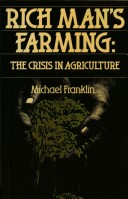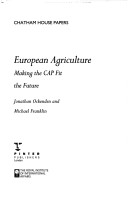Chatham House Papers
3 total works
This study examines why a crisis situation has been allowed to develop, and proposes the most effective ways - both nationally and internationally - to achieve more agricultural support and trade policies. This book should be of interest to students of politics, economics and international relations.
This volume is a study of present and future Common Agricultural Policy in the European Union. It focuses on the practicality of policy proposals in the face of huge challenges, especially in the context of EU enlargement to the east. The Common Agricultural Policy has ben important, arguably the most important, joint policy of the European Union for nearly 30 years and still accounts for over half of its expenditure. Long seen as a disaster by economists, many European governments are reluctant to face the political upheaval of further reforms which could benefit consumers, taxpayers and much of the rest of EU industry and services. This study analyzes the factors which will impact on the CAP over the next few years and offers suggestions for the future direction of EU agricultural policy. The changing market for food products, environmental pressures and evolving technological developments all provide the backdrop against which the influences of continuing budgetary constraints and the attitudes of member states will operate. Outside the EU itself, GATT and developments in central and Eastern Europe will add to the need for new policy directions.
Each of these factors is considered before some coherent and practical proposals are made for how European agricultural policy might develop in the future.
Each of these factors is considered before some coherent and practical proposals are made for how European agricultural policy might develop in the future.
Britain in the European Community
by Reece Franklin, M D M Franklin, and Michael Franklin
Published 20 December 1990
Britain often appears to be the odd one out in Europe. Fears have been expressed that it is being marginalized and that the key decisions are taken by Germany and France. How much truth is there in these allegations? And, if true, what are the reasons? Now that Britain's economic and, increasingly, political future is bound up with the development of the European Community, how does Britain ensure that its influence is commensurate with its standing and with the strength of its arguments? As the pattern of Europe changes, what kind of European structures would best suit British interests? These and similar issues are addressed in this study, both in general terms and in relation to major EC topics such as economic and monetary union and political union. The study examines the issues likely to be on the agenda of the two intergovernmental conferences of December 1990, and also includes chapters on enlargement, regional and social policies, the democratic deficit and the EC's post-1992 programme.


